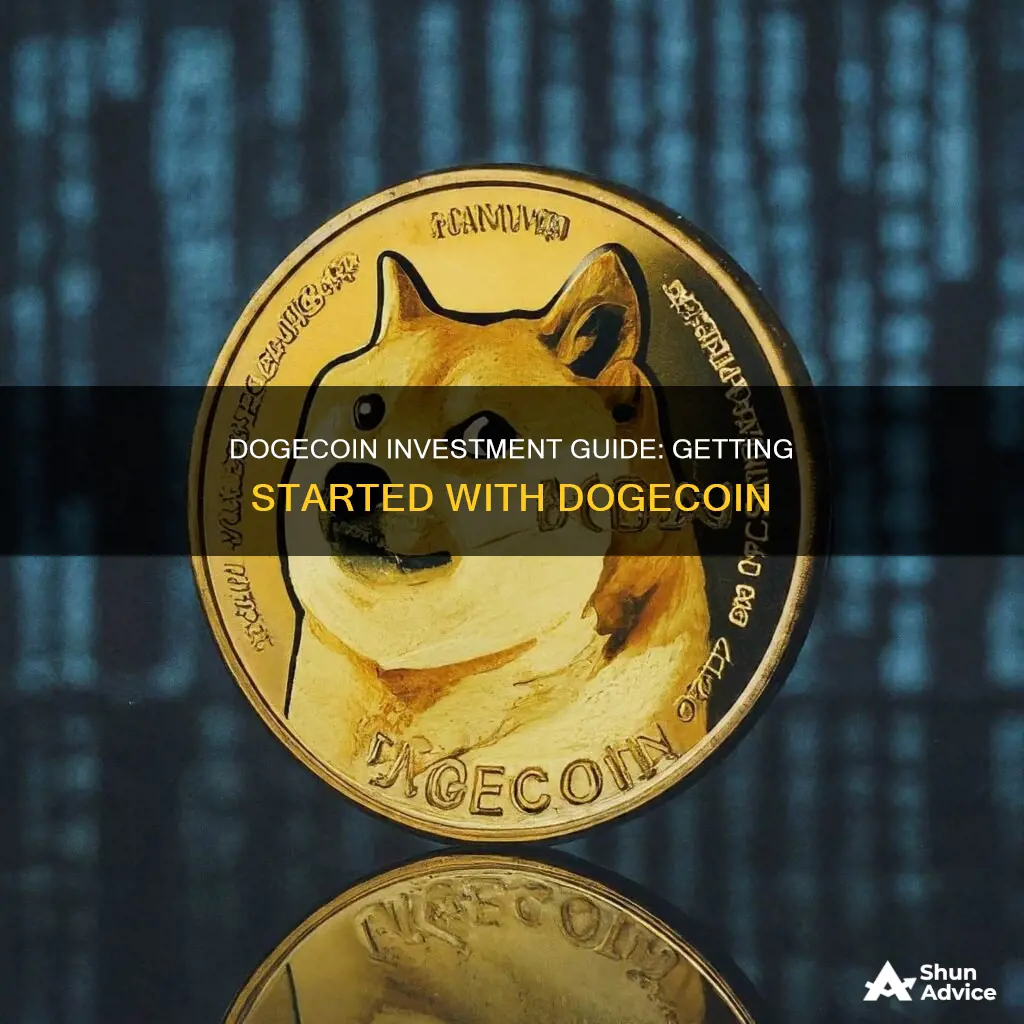
Dogecoin is a cryptocurrency that was created as a joke based on a popular internet meme of a Shiba Inu dog. Despite its lighthearted origins, Dogecoin has gained a devoted community and a passionate following on Reddit. It has also gained mainstream acceptance, with some merchants and businesses accepting Dogecoin as payment.
Dogecoin is a risky and volatile investment due to its unlimited supply and extreme fluctuations in value driven by social media movements and hype. However, it has seen price surges in the past, and its low transaction costs make it attractive for micro-transactions.
If you are considering investing in Dogecoin, it is important to do your research and only invest what you can afford to lose. Here are the steps to help you buy Dogecoin:
1. Sign up for a crypto exchange: Create an account on a well-known cryptocurrency exchange such as Coinbase, Kraken, or Binance by providing information like your email address, name, and phone number.
2. Verify your account: Provide proof of address and undergo a Know Your Customer (KYC) verification process if required.
3. Deposit funds to your account: You can deposit money into your cryptocurrency account through various methods, including credit or debit cards, bank transfers, or PayPal transfers, depending on the exchange's policies and your jurisdiction.
4. Find DOGE, check the market price, and buy: Search for Dogecoin (DOGE) on the exchange, check its market price, and make a purchase. Generally, it takes less than a minute before the DOGE appears in your crypto exchange wallet.
5. Consider your storage options: You can store your Dogecoin in your exchange's crypto wallet or withdraw it to a hot or cold crypto wallet for added security.
What You'll Learn

Choosing a Dogecoin wallet
When it comes to choosing a Dogecoin wallet, there are a few key factors to keep in mind. Firstly, it's important to understand the difference between hot and cold wallets. Hot wallets are those that maintain a constant connection to the internet, such as mobile apps, browser extensions, or downloadable software. Cold wallets, on the other hand, do not have a constant internet connection and are typically hardware devices that you can disconnect and store physically. While hot wallets offer convenience and accessibility, cold wallets provide superior security, making them less susceptible to hacking.
When selecting a Dogecoin wallet, it's crucial to consider your priorities regarding accessibility and security. Here are some recommended options:
Hot Wallets:
- Exodus: A multi-coin wallet accessible on multiple devices, including desktop (Windows, Mac, Linux) and mobile (Android, iOS). Exodus supports over 150 cryptocurrencies, including Dogecoin, and offers responsive customer support. However, it lacks two-factor authentication and cannot purchase cryptocurrencies with fiat currencies.
- Coinomi: A user-friendly mobile wallet supporting over 1,000 cryptocurrencies, including Dogecoin. Coinomi is easy to set up and allows you to store your private keys on your device. It also features an in-built ShapeShift exchange for added functionality.
- Binance: One of the most popular crypto exchange platforms, Binance can also function as a hot wallet for Dogecoin. It offers a wide range of trading pairs, including DOGE, and provides robust security measures. However, some beginners may find it a bit challenging to navigate.
- Kraken: Another well-known crypto exchange platform, Kraken offers a simple way to store Dogecoin. It emphasizes security and supports a good number of fiat currencies. However, its customer service has been described as less than helpful.
Cold Wallets:
- Ledger Nano X: One of the most popular cold wallets on the market, offering excellent security features. It supports over 5,500 cryptocurrencies, including Dogecoin, and has a sturdy and durable design. However, it is relatively expensive, costing around $149.
- Trezor Safe 3: An affordable and highly secure hardware wallet that supports over 7,000 digital assets, including Dogecoin. It features an ultra-secure chip and offers great backup options, including a 12- or 24-word recovery seed. The Trezor Safe 3 costs around $85.
- Trezor Model T: A top-notch security-focused hardware wallet with a touchscreen interface. It supports around 1,000 crypto assets, including Dogecoin. However, it is quite expensive, costing around $219.
- Ledger Nano S Plus: An excellent option for beginners, the Ledger Nano S Plus is a compact and discreet hardware wallet supporting over 5,500 assets, including Dogecoin. It features an NFT support and a larger display screen. It is affordably priced at around $79.
- Trezor One: The older version of the Trezor Model T, the Trezor One is still a well-regarded and secure hardware wallet. It offers advanced PIN code functionality and constant firmware updates. It's also more affordable, priced at around $69.
- KeepKey: A secure hardware wallet that supports over 7,000 crypto assets, including Dogecoin. KeepKey utilizes a random PIN code generator and allows for a 24-word recovery phrase. It has a unique design but may be too bulky for some users. It's affordably priced at around $49.
When choosing a Dogecoin wallet, it's essential to consider your needs and preferences. Hot wallets offer convenience and ease of access, while cold wallets provide superior security but may be more cumbersome to use. It's also worth noting that some wallets support multiple cryptocurrencies, so if you plan to invest in other coins besides Dogecoin, ensure that the wallet you choose accommodates your needs.
A Million-Dollar Question: Investing $100 in Bitcoin in 2010
You may want to see also

Selecting an exchange
Reputation and Security:
Look for well-established and reputable exchanges that have been in operation for a considerable amount of time. These exchanges have likely earned the trust of many users and will provide a safer environment for your transactions. Security should be a top priority, as you want to ensure your personal information and funds are protected.
Supported Payment Methods:
Different exchanges offer various payment methods, such as bank transfers, credit cards, or other cryptocurrencies. Choose an exchange that supports your preferred payment method and offers a smooth deposit and withdrawal process.
Liquidity and Trading Volume:
Opt for exchanges with high liquidity and substantial trading volume. This ensures that you can easily buy or sell Dogecoin without significantly impacting the market price. Higher liquidity also means that you can enter or exit a position without experiencing major price slippage.
Fees and Charges:
Exchanges typically charge fees for their services, and these fees can vary significantly between platforms. Compare the fees associated with trading, depositing, and withdrawing funds to find the most cost-effective option for your needs.
User Interface and Functionality:
A user-friendly interface can make your trading experience more accessible and less stressful. Look for exchanges with intuitive navigation, clear charts, and straightforward order placement processes. Additionally, consider the platform's functionality, such as the availability of advanced trading tools, if you plan to engage in more complex trading strategies.
Geographic Restrictions:
Some exchanges may have geographic restrictions, meaning they are not available in certain countries or regions. Ensure that the exchange you choose is accessible from your location and complies with the regulatory requirements of your jurisdiction.
Customer Support:
Opt for exchanges that offer responsive and reliable customer support. This is crucial, especially if you're new to crypto trading, as you may need assistance with various aspects of the platform or your transactions.
Additional Features:
Consider any additional features that are important to you, such as the ability to trade a wide range of cryptocurrencies or access to margin trading, futures, or staking opportunities.
- Binance: Binance is the world's most popular crypto exchange, offering a vast range of trading pairs and advanced features like futures, staking, and P2P exchange.
- MEXC Global: MEXC Global supports over 1000 trading pairs and is available in more than 170 countries. It offers features like margin trading, futures, and ETF's.
- Bybit: Bybit is a Singapore-based exchange with a user-friendly interface, offering various coin pairs and tools like derivatives and staking.
- Coinbase: Coinbase is known for its user-friendly interface and high level of security. It provides an easy way to buy, sell, and hold Dogecoin.
- Kraken: Kraken is another well-known exchange that offers simple and intuitive platforms for buying and selling cryptocurrencies.
- Robinhood: Robinhood is a mobile app that allows users to buy, sell, hold, send, and receive Dogecoin.
Remember to conduct your own research and carefully review the features, fees, and security measures of each exchange before making your decision.
Bitcoin Investment: Good Idea or Risky Business?
You may want to see also

Payment methods
Once you have chosen a crypto exchange or brokerage platform, you will need to deposit money into your account before you can start trading. The payment methods accepted will vary depending on the platform and your jurisdiction. Most exchanges will allow you to deposit money from a checking or savings account, and some may also accept wire transfers and PayPal transfers.
Some crypto exchanges also allow you to use a credit card to buy Dogecoin, but this is generally not recommended, as the transaction will be treated as a cash advance by your bank, attracting higher fees and interest rates.
If you already own cryptocurrency, you may be able to trade it for Dogecoin. However, not all cryptocurrencies can be exchanged for Dogecoin, and the availability of this option will depend on the platform.
After depositing money into your account, you can then use the balance to purchase Dogecoin.
Bitcoin Z: A Smart Investment Choice?
You may want to see also

Storage options
When you buy Dogecoin, it is usually kept in your crypto exchange's or brokerage's crypto wallet by default. However, some investors prefer to withdraw their crypto and store it in another wallet for added security.
There are two main types of crypto wallets: hot wallets and cold wallets. Hot wallets are digital and connected to the internet at all times, making them more susceptible to hacking. Cold wallets, on the other hand, are physical hardware that can be disconnected from the internet, providing an extra layer of security. Examples of cold wallets include the Ledger Nano S, Trezor One, and KeepKey.
Hot wallets are more convenient as they can be accessed from anywhere at any time. They are also often free, which makes them a popular choice among crypto holders. Examples of hot wallets include the Exodus Wallet, Dogechain Wallet, and Official Dogecoin Wallet.
It's important to note that cold wallets are generally more expensive than hot wallets, and there is a greater risk of losing access to your cryptocurrency if you lose or forget the password to your cold wallet.
Investing in the 2009 Double Eagle Gold Coin: Wise Choice?
You may want to see also

Risks and benefits
Dogecoin is a risky and volatile investment. It is important to remember that its returns are never guaranteed and impossible to predict. Its price is largely driven by social media movements and hype, making it unpredictable. It is also highly inflationary, as there is no limit on how many Dogecoins can be mined. The more Dogecoins that are mined, the more the price will drop.
Dogecoin is also not a good store of value. Unlike stocks or bonds, it does not pay dividends or interest. It is not backed by any substantial assets, so if the public loses interest, the price could theoretically fall to zero.
However, Dogecoin has a lot of potential as a payment system due to its fast transaction times and low fees. Its popularity means high liquidity, making it easy to buy and sell. This is attractive to investors who want to quickly liquidate assets if needed. Dogecoin is also a good entry point for investors who are new to the cryptocurrency market, as it is cheaper than many other cryptocurrencies.
Dogecoin is also easier to mine than Bitcoin, as the mathematical equations necessary to create new coins are easier and cheaper to complete. This means new Dogecoins can be mined faster than new Bitcoins.
Dogecoin has a loyal and supportive community. The Dogecoin Foundation is working to promote the use and adoption of Dogecoin, and the community is known for its friendly and welcoming ethos, often rallying around various causes and projects.
It is important to remember that cryptocurrencies are very risky investments, and it is recommended that investors should not invest more than they are willing to lose.
Invest in DeFi on Coinbase: A Beginner's Guide
You may want to see also
Frequently asked questions
You need to find a wallet that supports Dogecoin. There are both software wallets and hardware wallets that support Dogecoin. Different wallets may offer different features and levels of security, so be sure to do your research.
Dogecoin is only available on a limited number of exchanges, so you'll need to find one that offers the coin for trade and is legally operating in your jurisdiction. Make sure to evaluate your needs and investigate the exchange before signing up.
Financial planners generally recommend investing no more than 3% to 5% of your money in highly volatile assets like cryptocurrencies. Keep in mind that Dogecoin is a highly volatile and unpredictable asset.
You can buy Dogecoin on a cryptocurrency exchange, where you can purchase tokens with U.S. dollars or other digital assets. First, decide how much you want to buy and how you will pay for it. Then, select a payment option and place your order.







